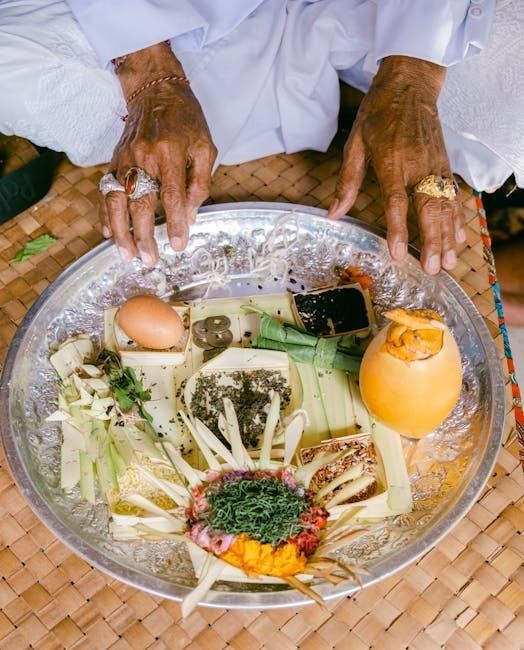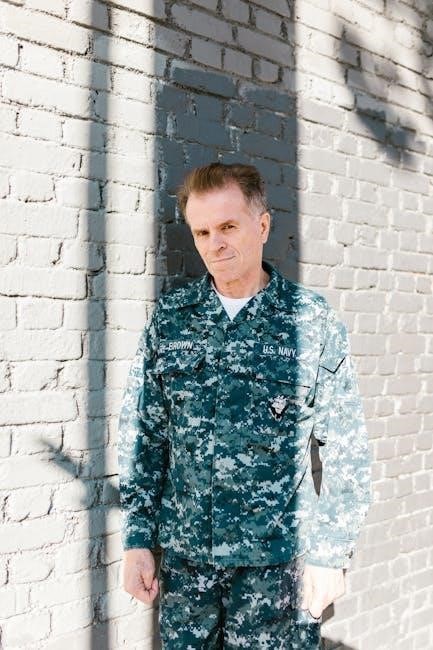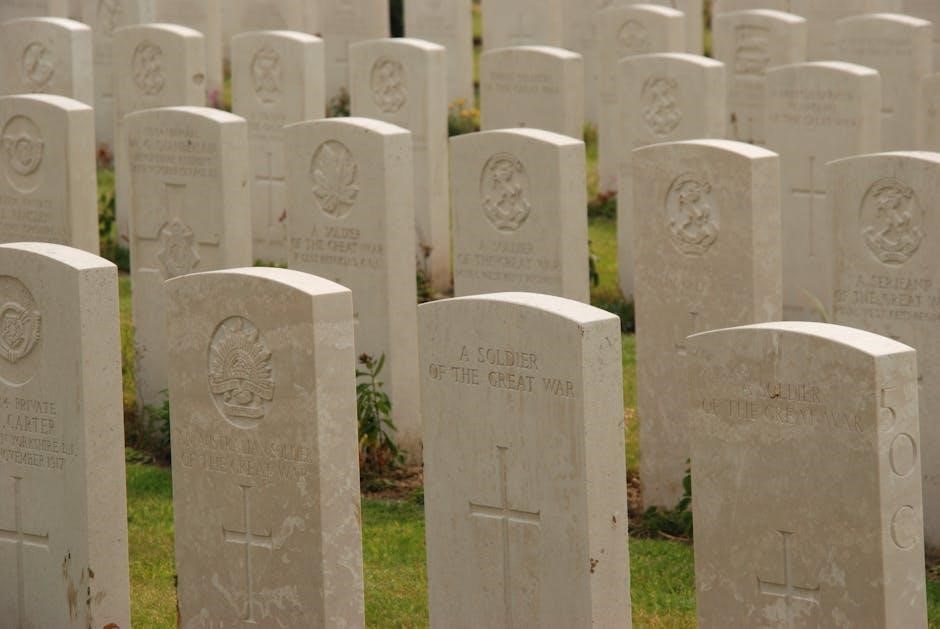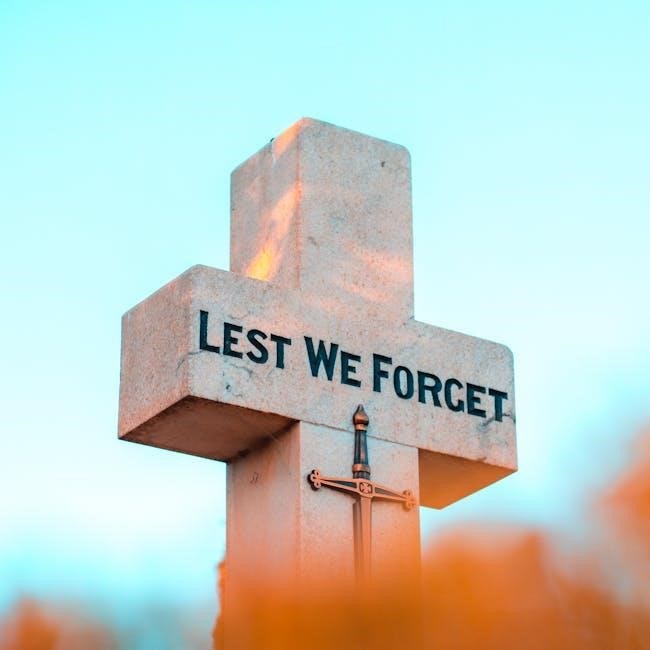“The Sacrifice PDF” explores the profound concept of sacrifice‚ delving into its historical‚ religious‚ and psychological dimensions. It examines how sacrifice shapes human experiences universally.
1.1 Overview of the Document
The document‚ titled “The Sacrifice PDF‚” delves into the multifaceted concept of sacrifice‚ offering a comprehensive exploration of its historical‚ religious‚ and psychological dimensions. It examines how sacrifice has shaped human experiences across cultures and time‚ highlighting its universal significance. The text discusses various forms of sacrifice‚ including religious rituals‚ personal acts of devotion‚ and societal contributions for the greater good. It also explores the emotional and psychological motivations behind sacrifice‚ drawing on examples from literature‚ media‚ and real-world events. Additionally‚ the document touches on the symbolism of altars and their role in connecting the human and divine realms. By blending historical context with modern perspectives‚ “The Sacrifice PDF” provides a thought-provoking analysis of this enduring theme.
1.2 Historical Context of Sacrifice
Historically‚ sacrifice has been a cornerstone of human culture‚ with roots tracing back to ancient civilizations. Early societies often practiced animal or human sacrifices to appease deities‚ ensure fertility‚ or maintain cosmic order. For instance‚ the Aztecs and Incas performed elaborate rituals‚ believing these acts would sustain life and prosperity. Similarly‚ in many ancient religions‚ sacrifice was a means of seeking divine favor or atonement for sins. The concept evolved over time‚ with major religions like Christianity‚ Judaism‚ and Islam incorporating sacrifice as a central tenet. These historical practices laid the foundation for modern interpretations of sacrifice‚ blending spiritual‚ cultural‚ and personal dimensions. The document examines how these ancient traditions have influenced contemporary understandings of sacrifice‚ making it a timeless and universal theme.

The Concept of Sacrifice in Religion
Sacrifice is a central tenet in many religions‚ including Christianity‚ Judaism‚ and Islam‚ symbolizing devotion‚ atonement‚ and spiritual growth. It reflects humanity’s quest for divine connection.
2.1 Animal Sacrifices in Ancient Cultures
Animal sacrifices were pivotal in ancient cultures‚ serving as offerings to deities to ensure prosperity‚ forgiveness‚ or divine favor. Many civilizations‚ such as the Aztecs and Mayans‚ practiced elaborate rituals‚ believing these acts appeased gods and maintained cosmic order. In ancient Israel‚ sacrifices were central to worship‚ with specific rules governing their execution. These practices symbolized devotion‚ atonement‚ and communal bonding. The act of sacrificing animals often represented surrendering something valuable to the divine‚ reflecting a deep belief in the transformative power of sacrifice. While practices varied‚ the underlying theme was a quest for connection with the sacred‚ highlighting sacrifice’s enduring role in human spirituality.
2.2 The Sacrifice of Jesus in Christianity
The sacrifice of Jesus in Christianity is central to its theology‚ viewed as the ultimate act of redemption. Jesus’s crucifixion is seen as a substitute for humanity’s sins‚ offering salvation through divine grace. This sacrifice embodies God’s love‚ providing reconciliation between humanity and the divine. It symbolizes the concept of atonement‚ where Jesus bears the consequences of sin on behalf of all people. The act is deeply symbolic‚ often referred to as the “Lamb of God‚” highlighting its purpose of purification and forgiveness. This sacrifice is celebrated in Christian rituals like the Eucharist‚ reinforcing its significance in the faith. It underscores the belief in Jesus’s divine mission to save humanity‚ making it a cornerstone of Christian belief and practice.
2.3 Sacrifice in Other Religions
Sacrifice is a universal theme across various religions‚ each interpreting it uniquely. In Hinduism‚ sacrifices often involve offerings to deities‚ such as fire rituals (yajñas)‚ to maintain cosmic balance. Buddhism‚ while emphasizing non-violence‚ includes symbolic sacrifices like offering food to monks or deities. Islam’s Eid al-Adha commemorates Ibrahim’s willingness to sacrifice his son‚ celebrating obedience and faith. In many indigenous cultures‚ sacrifices are offerings to ancestors or nature spirits‚ ensuring harmony and prosperity. These practices highlight the diverse ways sacrifice is used to connect with the divine‚ seek forgiveness‚ or honor sacred traditions. Each religion’s approach reflects its unique beliefs‚ yet all share the common thread of sacrifice as a profound act of devotion and transformation.

Psychological and Emotional Aspects of Sacrifice

Sacrifice evokes deep emotional responses‚ often involving love‚ duty‚ or faith. It can lead to personal growth‚ fulfillment‚ and a sense of purpose‚ despite the pain involved.
3.1 Why People Are Willing to Sacrifice
The willingness to sacrifice often stems from deep emotional connections‚ such as love‚ duty‚ or faith. Many people find meaning in surrendering personal desires for a greater cause or loved ones. Self-love and affirmations can motivate individuals to prioritize well-being‚ even if it requires difficult choices. Sacrifice is also driven by a sense of purpose‚ whether rooted in religious beliefs or a commitment to moral values. The act of giving up something valuable fosters personal growth and fulfillment‚ as it aligns actions with one’s core values and beliefs. This emotional and psychological resilience highlights the transformative power of sacrifice in shaping lives and communities.
3.2 The Emotional Impact of Sacrifice
The emotional impact of sacrifice can be profound‚ often leading to a mix of pain and fulfillment. It involves emotional struggles‚ as individuals confront the loss of something cherished. Yet‚ sacrifice can also bring emotional rewards‚ fostering resilience and inner peace. Many find validation in their choices‚ knowing they prioritized greater good over personal gain. The act of sacrificing can deepen self-awareness and strengthen relationships‚ creating lasting emotional bonds. However‚ it can also lead to feelings of emptiness or regret if the outcome differs from expectations. Ultimately‚ sacrifice shapes emotional landscapes‚ teaching individuals about their capacity for love‚ commitment‚ and selflessness.

Sacrifice in Literature and Media
Sacrifice is a timeless theme in literature and media‚ explored in works like The Hunger Games and The Kite Runner; These stories highlight sacrifice’s emotional depth and transformative power‚ resonating deeply with audiences.
4.1 “The Sacrifice” as a Literary Theme
The theme of sacrifice in literature is profound‚ often symbolizing redemption‚ love‚ or the greater good. In works like The Hunger Games‚ characters willingly sacrifice themselves to protect others‚ highlighting moral courage. Similarly‚ The Kite Runner explores sacrifice through redemption‚ as Amir seeks forgiveness by risking his life. These narratives evoke deep emotional responses‚ illustrating the universal power of sacrifice. Authors use sacrifice to explore complex human emotions‚ creating relatable and impactful stories. The theme transcends genres‚ appearing in both classic and modern literature‚ and serves as a mirror to societal values and ethical dilemmas. Through sacrifice‚ literature reflects the human condition‚ emphasizing selflessness and the enduring search for meaning.
4;2 The Role of Sacrifice in “The Ritual” and Related Works
In “The Ritual‚” sacrifice is a central theme‚ exploring the consequences of confronting ancient‚ supernatural forces. The novel‚ part of a series by Adam Nevill‚ delves into the psychological and physical toll of survival‚ where characters must make profound sacrifices to atone for past mistakes. Sacrifice here is both literal and metaphorical‚ reflecting themes of redemption and the cost of salvation. Similar works‚ such as “The Sacrifice‚” emphasize the idea of offering something valuable to appease higher powers or achieve balance; These narratives highlight the universality of sacrifice‚ whether in ritualistic practices or personal acts of selflessness‚ underscoring its enduring relevance in storytelling and human experience.

Sacrifice in Modern Society
Sacrifice in modern society encompasses personal acts of selflessness‚ such as career changes for family‚ and collective efforts like environmental activism‚ driving societal change and individual growth.
5.1 Personal Sacrifices for the Greater Good
Personal sacrifices for the greater good often involve individuals prioritizing the needs of others or society over their own desires. This can include career changes‚ financial sacrifices‚ or dedicating time to causes like environmental conservation or community service. Many people find fulfillment in contributing to societal change‚ even if it requires personal discomfort or loss. For instance‚ individuals might reduce their consumption habits to support sustainability or volunteer in underserved communities. These acts of selflessness not only benefit others but also foster a sense of purpose and personal growth. The willingness to make such sacrifices reflects a deep commitment to creating a better world‚ emphasizing the value of collective well-being over individual gain.
5.2 Sacrifice in the Context of War and Conflict
Sacrifice in war and conflict often involves profound personal and collective losses‚ shaping the course of history. Soldiers and civilians alike may surrender their lives‚ freedoms‚ or well-being for the sake of a nation‚ ideology‚ or survival. This form of sacrifice is deeply rooted in patriotism‚ duty‚ and the belief in a greater cause. Historical examples reveal how such sacrifices have been framed as noble acts‚ inspiring future generations. Yet‚ the emotional toll on families and communities remains immense. War sacrifices highlight the complexities of human conflict‚ where personal loss is weighed against the broader goals of peace and security. These acts of devotion underscore the resilience of the human spirit in the face of adversity.

The Symbolism of Sacrifice

Sacrifice symbolizes devotion‚ redemption‚ and transformation‚ often represented through altars and rituals. It bridges the human and divine‚ embodying selfless acts for greater purposes or spiritual renewal.
6.1 Altars and Their Significance
Altars are sacred spaces where humans connect with the divine‚ serving as platforms for spiritual communion and sacrifice. In “The Sacrifice PDF‚” altars symbolize transition and commitment‚ often marking a surrender of personal desires for a higher purpose. Historically‚ altars have been central to religious rituals‚ representing a bridge between the physical and spiritual realms. They embody the idea of offering something precious‚ whether tangible or intangible‚ to transcend earthly limitations. The act of approaching an altar signifies a willingness to let go‚ reflecting themes of devotion‚ redemption‚ and transformation. These structures are not merely physical but hold profound symbolic meaning‚ making them integral to the narrative of sacrifice explored in the document.
6.2 The Connection Between Sacrifice and Redemption
The connection between sacrifice and redemption lies in the transformative power of giving up something valuable to achieve deliverance or salvation. Sacrifice often serves as a means of atonement‚ forgiving past wrongs‚ or bringing about positive change. Historically‚ sacrifices have been made to seek divine forgiveness or to appease higher powers‚ leading to redemption. In literature and personal growth‚ characters or individuals may sacrifice something significant to achieve redemption‚ either for themselves or others. This act symbolizes commitment to change or growth‚ demonstrating resolve to improve or make amends. Through various contexts‚ “The Sacrifice PDF” explores how sacrifice becomes a powerful act leading to redemption‚ showcasing its universal significance in achieving positive outcomes and personal or collective salvation.

Sacrifice in Personal Development
Sacrifice plays a crucial role in personal growth‚ enabling individuals to let go of harmful patterns and embrace self-improvement. It fosters resilience and self-awareness‚ leading to meaningful transformation.
7.1 Self-Love and Self-Sacrifice
Self-love and self-sacrifice are deeply interconnected yet often misunderstood concepts. Self-love involves nurturing one’s emotional‚ mental‚ and physical well-being‚ while self-sacrifice requires giving up personal desires for greater good. Balancing these ensures healthy personal growth. True self-sacrifice stems from a place of self-love‚ as it avoids depletion of one’s own well-being. Practices like affirmations‚ journaling‚ and meditation help cultivate this balance‚ fostering resilience and purpose. By prioritizing self-love‚ individuals can engage in self-sacrifice without losing their sense of identity or fulfillment. This harmony is essential for sustainable personal development and emotional health.
7.2 The Role of Meditation and Affirmations
Meditation and affirmations are powerful tools for fostering inner peace and clarity‚ essential for making meaningful sacrifices. Meditation helps individuals connect with their true selves‚ guiding decisions aligned with their values. Affirmations‚ through positive repetition‚ rewire the mind to embrace self-love and resilience. Together‚ these practices create a balanced mindset‚ enabling individuals to sacrifice without losing their sense of purpose. By cultivating mindfulness and self-awareness‚ meditation and affirmations empower people to navigate life’s challenges with grace and intention‚ ensuring sacrifices are meaningful and sustainable.
“The Sacrifice PDF” underscores the universal significance of sacrifice‚ reflecting its impact on personal growth‚ faith‚ and societal change‚ while emphasizing self-love and resilience.

8.1 The Universal Significance of Sacrifice
Sacrifice transcends cultures and time‚ embodying a profound human act of devotion‚ love‚ and resilience. It bridges the spiritual and the mundane‚ reflecting deep connections to faith‚ family‚ and community. From ancient rituals to modern-day acts of selflessness‚ sacrifice serves as a testament to the human spirit’s capacity for unconditional giving. It symbolizes redemption‚ renewal‚ and the pursuit of greater good‚ resonating across religious‚ literary‚ and personal narratives. Whether in the form of personal loss or heroic deeds‚ sacrifice remains a universal language‚ uniting people in shared values and aspirations. Its enduring relevance underscores its role in shaping identities‚ fostering empathy‚ and inspiring transformation.
8.2 Final Thoughts on “The Sacrifice PDF”
“The Sacrifice PDF” offers a profound exploration of sacrifice‚ weaving together historical‚ religious‚ and psychological insights. It highlights how sacrifice‚ whether personal or collective‚ shapes human identity and purpose. Through its pages‚ readers encounter a universal theme that transcends cultures and time‚ reflecting the depths of human devotion and resilience. The document emphasizes the transformative power of sacrifice‚ illustrating its role in fostering growth‚ redemption‚ and connection. By blending personal reflections with broader societal contexts‚ “The Sacrifice PDF” provides a holistic understanding of this enduring concept. It leaves readers with a renewed appreciation for the sacrifices that define us and inspire us to embrace our own paths of giving and growth.